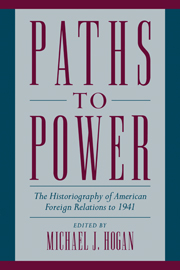Book contents
- Frontmatter
- Dedication
- Contents
- The Authors
- Preface & Acknowledgments
- 1 Introduction
- 2 New Directions in the Study of Early American Foreign Relations
- 3 The Great American Desert Revisited: Recent Literature and Prospects for the Study of American Foreign Relations, 1815-1861
- 4 Coming to Terms with Empire: The Historiography of Late Nineteenth-Century American Foreign Relations
- 5 Symbiosis versus Hegemony: New Directions in the Foreign Relations Historiography of Theodore Roosevelt and William Howard Taft
- 6 The Reclamation of Woodrow Wilson?
- 7 Reaching for the Brass Ring: The Recent Historiography of Interwar American Foreign Relations
- 8 The United States and the European War, 1939-1941: A Historiographical Review
- 9 The Origins of the Second World War in Asia and the Pacific: Synthesis Impossible?
- Index
3 - The Great American Desert Revisited: Recent Literature and Prospects for the Study of American Foreign Relations, 1815-1861
Published online by Cambridge University Press: 12 October 2018
- Frontmatter
- Dedication
- Contents
- The Authors
- Preface & Acknowledgments
- 1 Introduction
- 2 New Directions in the Study of Early American Foreign Relations
- 3 The Great American Desert Revisited: Recent Literature and Prospects for the Study of American Foreign Relations, 1815-1861
- 4 Coming to Terms with Empire: The Historiography of Late Nineteenth-Century American Foreign Relations
- 5 Symbiosis versus Hegemony: New Directions in the Foreign Relations Historiography of Theodore Roosevelt and William Howard Taft
- 6 The Reclamation of Woodrow Wilson?
- 7 Reaching for the Brass Ring: The Recent Historiography of Interwar American Foreign Relations
- 8 The United States and the European War, 1939-1941: A Historiographical Review
- 9 The Origins of the Second World War in Asia and the Pacific: Synthesis Impossible?
- Index
Summary
Like the “Great American Desert” of old, the period between 1815 and 1861 might as well be regarded as a desert in the recent historiography of American foreign relations. Once a period of vital concern to diplomatic historians in which a generation established their scholarly reputations, contemporary historians of American foreign relations have all but abandoned the Middle Period as an area of investigation, with the consequence that the diplomacy and foreign policy of the era is heading toward oblivion. Many Colleges and universities have dropped courses dealing with American foreign relations, and courses on the midnineteenth Century are the first to go. Non-diplomatic historians of nineteenth-century America rarely mention the international relations of the United States in their studies. This trend can be reversed. Just as the seemingly desolate Great American desert masked a rieh land that beckoned explorers, so too does the foreign relations of the Middle Period contain a number of unan swered questions and unexploited areas that deserve renewed consideration.
The current lack of interest and dearth of scholarship in the diplomacy of the Middle Period has not gone without notice. Lester D. Langley, in discussing the historiography of the period from 1812 to 1840, included only six diplomatic studies published between 1960 and 1973; the bulk of his examination rested upon works written considerably earlier. Anna Kasten Nelson, in dealing with the years between 1840 and 1865, suggested that an all-consuming interest in the twentieth Century, the decline of interest in the political history of the nineteenth, and the willingness of revisionists to rely on the interpretations of Richard Van Alstyne lay at the root of the problem.
Nelson's judgment is not entirely correct. Nineteenth-century political history remains a flourishing field. In addition, a few revisionists, most notably William Appleman Williams and Walter LaFeber, have written on the period, although Williams's interpretation was clearly aimed at the post-Civil War period, and LaFeber's work has been restricted to an introductory essay and interpretative textbook summaries. The chief problem seems to be that political history has moved in new directions, so that the “new political history” appears to bear little relevance to concurrent foreign relations. Also, as Nelson suggests, the revisionists remain firmly rooted in the late nineteenth and twentieth centuries, at least as far as original research goes.
- Type
- Chapter
- Information
- Paths to PowerThe Historiography of American Foreign Relations to 1941, pp. 44 - 78Publisher: Cambridge University PressPrint publication year: 2000
- 2
- Cited by



